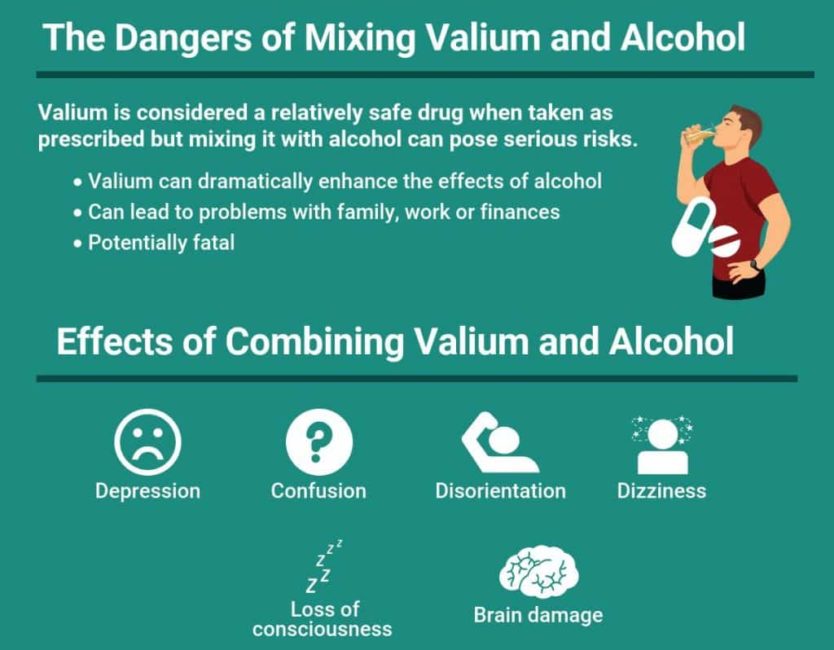Valium and alcohol are both sedatives, so combining the two enhances the sedative effect and can lead to abuse, loss of consciousness and brain damage.
Although those who mix Valium and alcohol are well aware of what they consider to be “benefits,” they may not fully know or understand the potential negative side effects of this combination. Valium, in general, is considered a relatively safe prescription drug, when taken as prescribed. However, when it’s abused or mixed with a substance like alcohol, it can pose serious risks to the body.
Article at a Glance:
- Mixing Valium and alcohol is never recommended
- Valium is considered relatively safe when taken as prescribed
- Mixing Valium with alcohol can pose serious risks
The Dangers of Mixing Valium & Alcohol
People often combine the two substances to enhance the effects of Valium, unaware of the risks. Mixing these two substances is never recommended because, in addition to the many health risks (listed below), it can be fatal.
Combining Valium with alcohol can cause drowsiness, dizziness, impaired motor control, memory problems and difficulty breathing, including loss of consciousness and brain damage. Valium can dramatically enhance the effects of alcohol in the bloodstream. This results in a euphoric feeling, which can then lead to repeated abuse of both substances combined. This also increases the risk of overdose.
Comparing Valium & Alcohol’s Side Effects
Valium and alcohol both have relaxing effects, but they also have various negative side effects if they’re abused. These effects vary for each person and are dependent on the dose taken and the user’s overall health. If you have a prescription for Valium, take only the prescribed dosage, and follow your doctor’s instructions.
There are more than a dozen short-term and long-term side effects that affect both the brain and the body.
- Poor judgment
- Slurred speech
- Disorientation
- Double vision
- Dry mouth
- Tremors
- Nausea or vomiting
- Painful or difficult urination
- Loss of appetite
- Muscle spasms
- Seizures
- Memory loss
- Impaired fine muscle coordination
- High blood pressure
- Shortened attention span
- Unconsciousness
- Impaired judgment
- Vomiting
Abusing the two substances can also result in various behavioral or social problems, such as depression and alienation from family. In some cases, those who abuse these substances experience problems with work and finances as well.
Getting Help for Substance Abuse
If you’re dealing with an addiction to Valium and alcohol, either as separate or combined substances, we can help you down the road to recovery. The Recovery Village has several locations throughout the country. Each center offers several individualized treatment programs and is staffed by a team of experienced, compassionate medical professionals. Call us today to learn more from one of our intake specialists. Recovery is just a call away.


U.S. Food and Drug Administration. “Valium (Diazepam) Label.” 2016. Accessed June 25, 2020.
National Institute on Alcohol Abuse and Alcoholism. “Harmful Interactions: Mixing Alcohol With Medicines.” 2014. Accessed June 25, 2020.
The Recovery Village aims to improve the quality of life for people struggling with substance use or mental health disorder with fact-based content about the nature of behavioral health conditions, treatment options and their related outcomes. We publish material that is researched, cited, edited and reviewed by licensed medical professionals. The information we provide is not intended to be a substitute for professional medical advice, diagnosis or treatment. It should not be used in place of the advice of your physician or other qualified healthcare providers.
